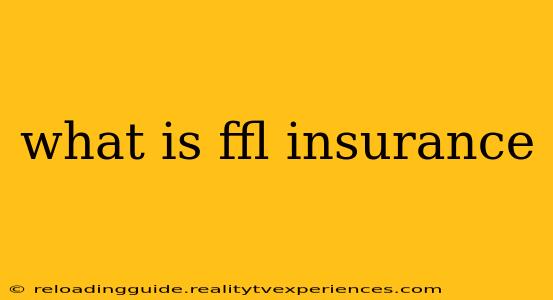For Federal Firearms Licensees (FFLs), insurance isn't just a good idea—it's often a necessity. Operating within the complex regulatory landscape of firearms sales and transfers demands robust coverage to protect against a wide range of potential liabilities. This article delves into the crucial aspects of FFL insurance, explaining what it is, why it's needed, and the key types of coverage available.
What is an FFL and Why Do They Need Insurance?
A Federal Firearms License (FFL) is required by the Bureau of Alcohol, Tobacco, Firearms and Explosives (ATF) for anyone involved in the business of importing, manufacturing, or dealing in firearms. This includes gun shops, pawnbrokers, and even some online retailers. The responsibilities of an FFL are extensive and carry significant legal and financial risks. This is where FFL insurance steps in.
FFLs face potential liabilities from a number of sources:
- Customer Injury or Death: Accidents involving firearms on the premises or resulting from the sale of a defective weapon.
- Theft or Loss: Covering the value of stolen or lost firearms from the licensee's inventory.
- Liability Claims: Lawsuits stemming from negligence in the sale of firearms, improper storage, or other violations of federal or state regulations.
- Regulatory Violations: Fines and penalties levied by the ATF for non-compliance with federal firearms laws.
Types of FFL Insurance Coverage: A Closer Look
Several key types of insurance policies cater to the specific needs of FFLs:
1. General Liability Insurance:
This is a foundational policy covering bodily injury or property damage caused by the licensee's business operations. This could include a customer tripping and injuring themselves in the store or damage caused by a firearm malfunction during a demonstration. It's crucial to ensure your policy adequately covers the unique risks associated with handling firearms.
2. Product Liability Insurance:
This protects the FFL against claims arising from defects in the firearms they sell. If a firearm malfunctions and causes injury or damage, this coverage helps mitigate the financial burden of potential lawsuits.
3. Crime Insurance:
This type of policy covers losses due to theft, robbery, or embezzlement. For an FFL, this is particularly important, given the high value of their inventory. This often includes coverage for employee dishonesty.
4. Professional Liability Insurance (Errors & Omissions):
Also known as E&O insurance, this covers claims arising from errors or omissions in professional services. For FFLs, this could include mistakes in paperwork, failing to properly conduct background checks, or neglecting to comply with ATF regulations.
Finding the Right FFL Insurance: Key Considerations
Choosing the right insurance policy requires careful consideration of several factors:
- Coverage Amounts: Ensure sufficient coverage limits are in place to protect against significant losses.
- Policy Exclusions: Carefully review policy exclusions to understand what isn't covered.
- Insurer Reputation: Choose a reputable insurer with experience in the firearms industry.
- Premium Costs: Balance the cost of premiums with the level of protection offered.
- State-Specific Requirements: Be aware of any specific insurance requirements imposed by your state.
Conclusion: Protecting Your Business and Reputation
Obtaining adequate FFL insurance is not optional; it's a critical component of responsible business operation. By understanding the various types of coverage available and carefully selecting a policy that addresses your specific needs, you can protect your business, your assets, and your reputation within the firearms industry. Always consult with an insurance professional specializing in the firearms industry to ensure you have the appropriate level of protection.

